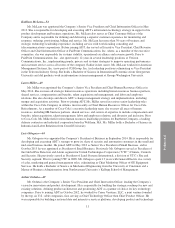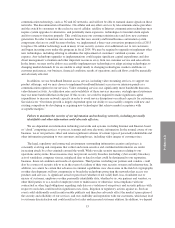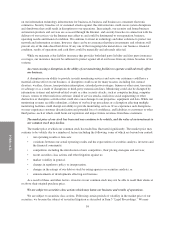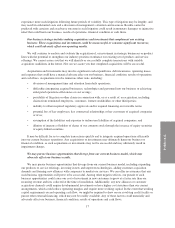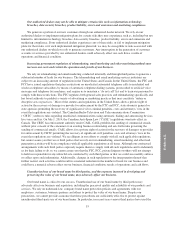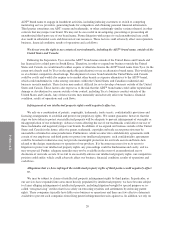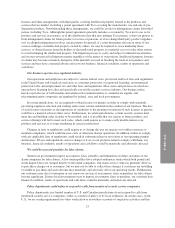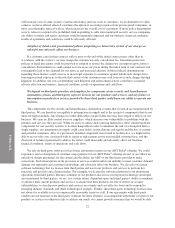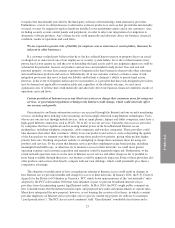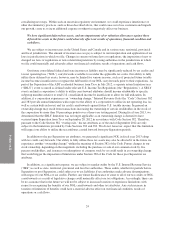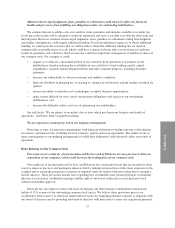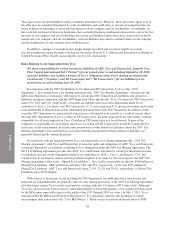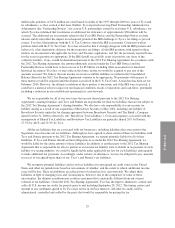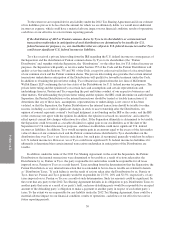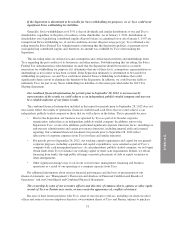ADT 2014 Annual Report Download - page 87
Download and view the complete annual report
Please find page 87 of the 2014 ADT annual report below. You can navigate through the pages in the report by either clicking on the pages listed below, or by using the keyword search tool below to find specific information within the annual report.
FORM 10-K
licenses and other arrangements with third parties covering intellectual property related to the products and
services that we market, including a patent agreement with Tyco covering the manufacture, use and sale of pre-
Separation products. Notwithstanding these arrangements, we could be at risk for infringement claims from third
parties, including Tyco. Although the patent agreement generally includes a covenant by Tyco not to sue us for
products and services in existence as of the distribution date that may infringe Tyco patents, it does not protect us
from infringement claims for future product or service expansions, or if we change third-party product suppliers
or if an alleged infringement involves certain patents. In general, if a court determines that one or more of our
services infringes on intellectual property owned by others, we may be required to cease marketing those
services, to obtain licenses from the holders of the intellectual property at a material cost or to take other actions
to avoid infringing the intellectual property. The litigation process is costly and subject to inherent uncertainties,
and we may not prevail in litigation matters regardless of the merits of our position. Intellectual property lawsuits
or claims may become extremely disruptive if the plaintiffs succeed in blocking the trade of our products and
services and may have a material adverse effect on our business, financial condition, results of operations and
cash flows.
Our business operates in a regulated industry.
Our operations and employees are subject to various federal, state, provincial and local laws and regulations
in the United States and Canada in such areas as consumer protection, occupational licensing, environmental
protection, labor and employment, tax and other laws and regulations. Most states and provinces in which we
operate have licensing laws directed specifically toward the security services industry. Our business relies
heavily upon the use of both wireline and wireless telecommunications to communicate signals, and
telecommunications companies are regulated by federal, state and local governments.
In certain jurisdictions, we are required to obtain licenses or permits in order to comply with standards
governing employee selection and training and to meet certain standards in the conduct of our business. The loss
of such licenses or permits or the imposition of conditions to the granting or retention of such licenses or permits
could have a material adverse effect on us. Furthermore, in certain jurisdictions, certain security systems must
meet fire and building codes in order to be installed, and it is possible that our current or future products and
service offerings will fail to meet such codes, which could require us to make costly modifications to our
products and services or to forgo marketing in certain jurisdictions.
Changes in laws or regulations could require us to change the way we operate or to utilize resources to
maintain compliance, which could increase costs or otherwise disrupt operations. In addition, failure to comply
with any applicable laws or regulations could result in substantial fines or revocation of our operating permits
and licenses. If laws and regulations were to change or if we or our products failed to comply with them, our
business, financial condition, results of operations and cash flows could be materially and adversely affected.
We could be assessed penalties for false alarms.
Some local governments impose assessments, fines, penalties and limitations on either customers or the
alarm companies for false alarms. A few municipalities have adopted ordinances under which both permit and
alarm dispatch fees are charged directly to the alarm companies. Our alarm service contracts generally allow us
to pass these charges on to customers, but we may not be able to collect these charges if customers are unwilling
or unable to pay them and such outcome may materially and adversely affect our operating results. Furthermore,
our customers may elect to terminate or not renew our services if assessments, fines or penalties for false alarms
become significant. If more local governments were to impose assessments, fines or penalties, our customer base,
financial condition, results of operations and cash flows could be materially and adversely affected.
Police departments could refuse to respond to calls from monitored security service companies.
Police departments in a limited number of U.S. and Canadian jurisdictions do not respond to calls from
monitored security service companies, either as a matter of policy or by local ordinance. In certain cases, in the
U.S., we are seeing requirements for video verification or eyewitness accounts of suspicious activities and this
21


